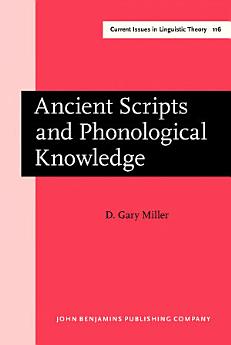Ancient Scripts and Phonological Knowledge
Sep 1994 · Current Issues in Linguistic Theory Book 116 · John Benjamins Publishing
Ebook
139
Pages
reportRatings and reviews aren’t verified Learn More
About this ebook
This study investigates the properties of several ancient syllabic and linear segmental scripts to make explicit the aspects of linguistic knowledge they attempt to represent. Some recent experimental work suggests that nonliterate speakers do not have segmental knowledge and that only syllabic knowledge is 'real' or accessible, whence the ubiquity of syllabaries. Miller disputes this by showing that such tests do not distinguish relevant types of knowledge, and that linguistic analysis of the ordering and writing conventions of early Western scripts corroborates the evidence from language acquisition, use, and change for segment awareness. By coding segments, the ancient syllabaries represented more phonological knowledge than the alphabet, which was a poor compromise between the vowelless West Semitic scripts and the vowel-redundant syllabic scripts.
A wide range of information about early scripts and their development is combined with a new theory of the syllable as 'Sonority Phrase'. The book's value is further enhanced by thorough discussion of the issues from a broad range of theoretical and applied viewpoints, including language play and change, cognition, literacy, and cultural history.
A wide range of information about early scripts and their development is combined with a new theory of the syllable as 'Sonority Phrase'. The book's value is further enhanced by thorough discussion of the issues from a broad range of theoretical and applied viewpoints, including language play and change, cognition, literacy, and cultural history.
Rate this ebook
Tell us what you think.
Reading information
Smartphones and tablets
Install the Google Play Books app for Android and iPad/iPhone. It syncs automatically with your account and allows you to read online or offline wherever you are.
Laptops and computers
You can listen to audiobooks purchased on Google Play using your computer's web browser.
eReaders and other devices
To read on e-ink devices like Kobo eReaders, you'll need to download a file and transfer it to your device. Follow the detailed Help Center instructions to transfer the files to supported eReaders.










